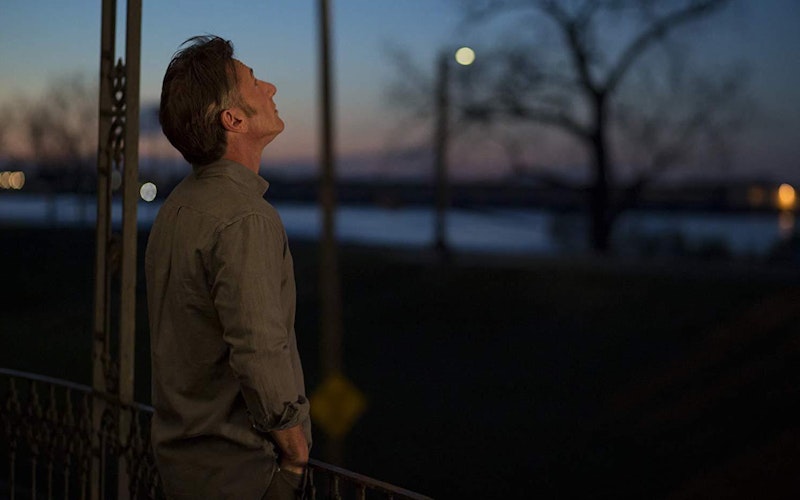
TV
The Limited Lamentation of The First
Editor’s note: This piece contains spoilers for The First.
Lament is an important but often ignored part of Christianity. We like to focus on the hope, joy, and possibility of the gospel, the reassurance that God sees us and loves us. Sometimes we forget that there’s an entire book of the Bible dedicated to sorrow. But focusing only on the good things fails to acknowledge the reasons we need hope in the first place: the real, deep pain of life that reminds us of our limits.
Our strain against those mortal limits make for great storytelling, particularly in instances where we’re discussing boundary-pushing human endeavors. There are few better examples of this than stories about space exploration. Our efforts to discover what lies beyond the world we know are fraught with confrontations of mortality, as well as the thrilling possibility of making advancements that last far beyond our own tiny lives. But again, as in the church, we focus primarily on success. Think of Apollo 13 or The Right Stuff. Even in First Man, the new Neil Armstrong biopic, there may be fear involved, but we know success is assured. We’re probably never going to see Challenger: The Movie.
The closest we’re likely to come to that is The First, a Hulu series about the first manned mission to Mars from House of Cards creator Beau Willimon. The First has lamentation first and foremost on its mind. The show’s eight-episode inaugural season, which debuted in September, may look towards the stars, but its main concerns are heavy and earthbound. Willimon and the show’s team use our ambitions of space flight to explore the human pain and brokenness that make the final frontier so attractive in the first place.
Set in the near future, the show begins with the launch of the Providence I, a rocket created by a NASA-contracted private firm taking a group of astronauts to land on the surface of the red planet. The crew’s former commander, Tom Hagerty (Sean Penn), is watching from home, having been cut from the mission by CEO Laz Ingram (Natascha McElhone) for reasons relating to a personal tragedy. Shortly after liftoff, the rocket explodes in midair, killing the crew in front of the friends and family who have gathered to watch them make history.
The rest of the season follows Ingram’s and Hagerty’s attempts to rebuild public trust and funding for the Mars project, in hopes of launching a second mission. It also dives deep into the personal issues faced by the crew of Providence II, led by Hagerty, who is dealing with the suicide of his wife while simultaneously helping his traumatized daughter Denise (Anna Jacoby-Heron) overcome drug addiction.
A show about space exploration that’s actually about human pain is an admirable, ambitious undertaking. Yet rather than move through that pain or even hint at hope on the other side, The First decides to wallow in it for far too long. There are reminders of mortal anguish all around, from Hagerty’s wife’s death to the dementia suffered by a crew member’s mother to the subtle references to climate change. The show often feels like a steady downward slide, rather than a trip into and back out of a valley.
The First has lamentation first and foremost on its mind.
In an interview with The Covenant Companion, pastor and theologian Soong-Chan Rah notes that part of the power of the book of Lamentations lies in its forward movement. Lamentations reminds us of the value of grief, but also—especially Lamentations 3—reassures us that we are never alone in our suffering. We have God’s love to get us through dark times, “for his compassions never fail.” It’s important to grieve. But grieving isn’t all there is.
In The First, however, grief is ever-present. The show’s dour mood stretches beyond the point of necessary confrontation. It lingers on tough moments, sometimes taking an entire episode to mine the depths of a specific tragedy. This not only slows down the plot, but also creeps into the editing and pacing, even defining the muted David Fincher-esque color palette. It’s not uncommon while watching The First to reach what seems like an episode’s natural conclusion, only to discover there’s still 20 minutes left.
This might feel less oppressive if episodes of the series were spread out once per week, as with a broadcast schedule. The First’s heaviness, plus the bulk episode release, make the show feel less like an experience and more like an endurance test. In a once-weekly format, there’s more room to consider each episode on its own. But in a binge-ready streaming format, The First’s inaugural season has to be a complete proof of concept, with an arc that carries the audience through each episode and makes them want to come back for more. There just isn’t enough momentum here to suggest it’s worth investing the effort.
In Hebrews 6, we are told that God’s promise is “an anchor for the soul, firm and secure,” a reminder that our heavenly father wants good for us, even when it’s hard for us to see what that good is. Lament is important because it addresses our past and existing pain, while looking toward the future, knowing that something different lies on the other side. Without that hope, we’re just left with despair. There may be some hope forthcoming for The First, but that possibility is a long way off. For now at least, the show refuses to drive toward the bright light at the end of the tunnel. Instead, it has parked itself firmly in the darkest part, refusing to move.
Topics: TV